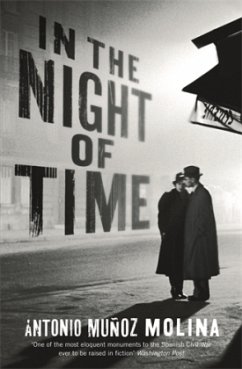October 1936. Spanish architect Ignacio Abel arrives at Penn Station, the final stop on his journey from war-torn Madrid, where he has left behind his wife and children, abandoning them to uncertainty. Crossing the fragile borders of Europe, he reflects on months of fratricidal conflict in his embattled country, his own transformation from a bricklayer's son to a respected bourgeois husband and professional, and the all-consuming love affair with an American woman that forever alters his life.
A rich, panoramic portrait of Spain on the brink of civil war, In the Night of Time details the passions and tragedies of a country tearing itself apart. Compared in scope and importance to War and Peace , Muñoz Molina's masterpiece is the great epic of the Spanish Civil War written by one of Spain's most important contemporary novelists.
A rich, panoramic portrait of Spain on the brink of civil war, In the Night of Time details the passions and tragedies of a country tearing itself apart. Compared in scope and importance to War and Peace , Muñoz Molina's masterpiece is the great epic of the Spanish Civil War written by one of Spain's most important contemporary novelists.
immense, luminous panorama of the Spanish Civil War ... one of the many wonders of this novel is how Molina integrates the personal so closely with the political ... in the fine tradition of novels of everything, reaching back to Cervantes by way of Bellow and Hemingway ... He brings an encyclopedic knowledge of the times to bear in a way that never drags on the narrative ... In a novel so concerned with the flow of memory and time, it seems fitting that the final chapters are set on the banks of the Hudson River, where Ignacio has been commissioned to design a library. This novel feels as vast as a library, and as compellingly seductive as a river Gerard Woodward Independent

